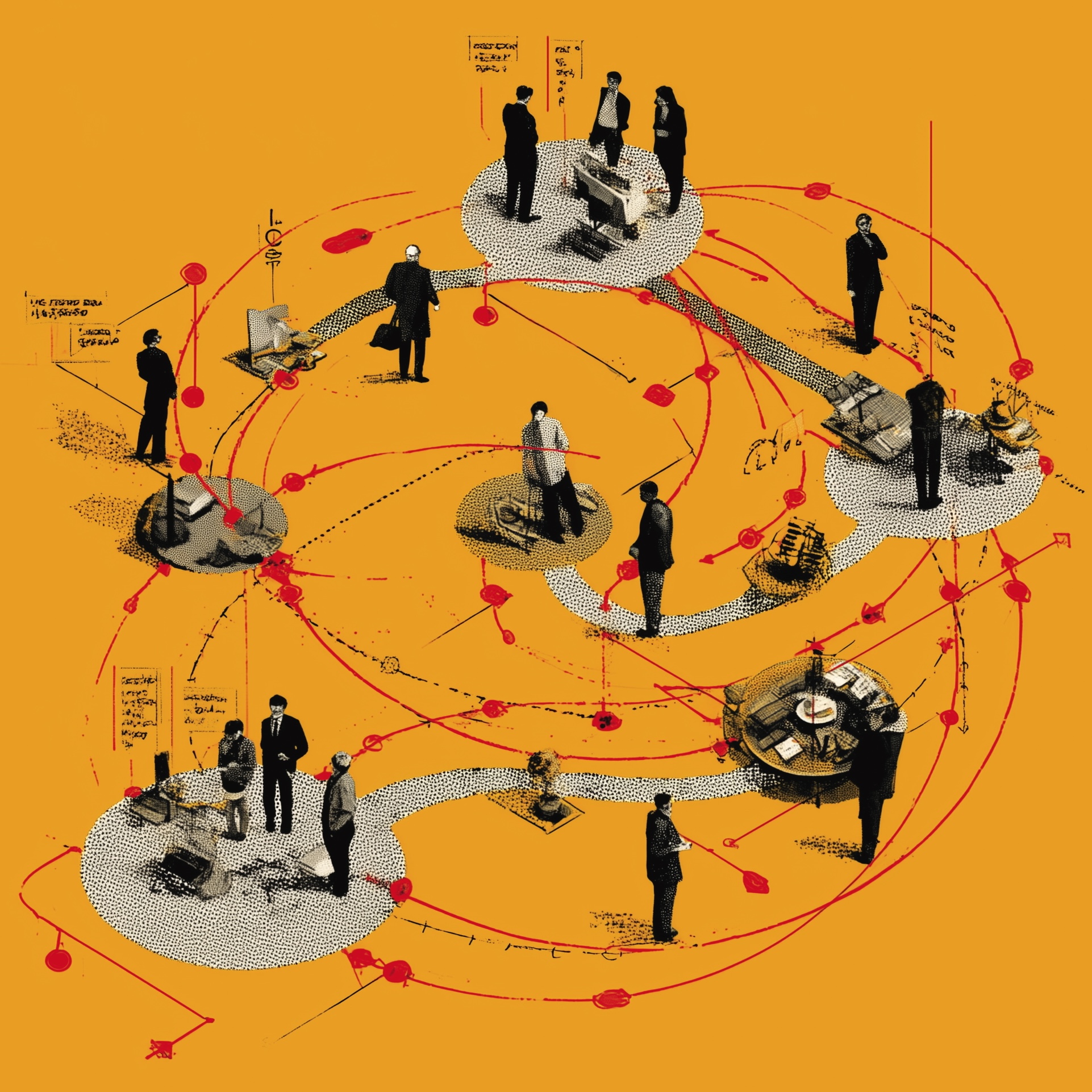Abuse can wreck your life and your career – but good managers can make a huge difference
Domestic abuse blights the lives thousands of NHS staff every year, and the problem has only got worse since the start of the pandemic, writes Craig Ryan. But work can be an important refuge and source of strength for survivors, and good support from managers and employers can be a lifeline.

Look around the office. Could someone on your team be struggling because they’re being abused at home? The media stereotypes about domestic abuse—the working class woman with a black eye, the mugshot of the thuggish-looking perpetrator—are so powerful, it can be hard to imagine the same thing happening to the professionals and managers you work with every day. But think again.
“You can throw all the stereotypes out the window,” says Jo Gough, chief executive of RISE, a Brighton-based charity that helps people going through domestic abuse. “There’s no typical survivor, except to say that they are generally female.” It affects people from all backgrounds, all religions and none, all professions and all income brackets. “We’ve had millionaires staying in our refuge,” she adds.
In the UK, one in four women and one in seven men will experience domestic abuse at some point in their lives. That’s hundreds of thousands of NHS staff. But until recently, employers and managers—and all too often the police—saw domestic abuse as a private matter, best left to the parties themselves to resolve. Managers didn’t want to get involved. Colleagues whispered behind their hands but said nothing. Survivors kept their heads down, hoping no one would notice how the abuse at home was affecting them at work.
Lifting people off the floor
But both employers and trade unions now recognise that a social problem of this magnitude can’t be kept out of the workplace. “Why wouldn’t domestic abuse be a workplace issue, given the prevalence of it and the statistical likelihood that our staff would be affected?” asks Samantha Whann, HR service manager at Belfast Health and Social Care Trust. The trust, which employs more than 20,000 staff—84% of them women—has seen its award-winning domestic abuse policy, developed over 15 years, adopted as a model by many other NHS organisations and even private companies.
Ray Rafferty, chair of the Belfast Trust trade unions, says the policy is a “true example of what partnership working can deliver”, born out of a passionate shared commitment to what he describes as “lifting people off the floor, and making them bigger, better and stronger than ever before”.
Rafferty praises the “courageous work of managers, who are challenging what they see, not putting it aside, saying, ‘Oh, not that’s not my problem’. He describes how one phone call from a manager worried about an absent employee “led to me getting the police to kick in the front door”, to find the staff member being held hostage by their partner. “That staff member has moved up four or five bands now; they’re working as a manager at another trust, and living a full happy life,” he says proudly. “That’s the difference this policy can make to people.”
Most domestic abuse isn’t so obvious. Belfast’s policy defines domestic abuse as “coercive control and the misuse of power by one person over another within an intimate or family relationship”. As well as physical and sexual violence, that can mean controlling someone’s money, limiting their social contact, dictating what they wear or eat, harassing them at work or sabotaging their careers.
“Domestic abuse has a really prevalent impact on every facet of your life,” says Orla Barron, the trust’s equality lead. “It isn’t something that can shrugged off and left at the front gate when you arrive for work.” Abusers will often target their partner’s job, she explains, “because abuse is fundamentally about control, and in the workplace they’re not necessarily in control of everything as they might be at home.”
“My job was really important to me”
Nicky* is a manager with a community NHS trust in southern England. She was abused by her partner for five years and came close to losing her job. “You’re very isolated when you’re going through it but you can escape a bit at work,” she explains. “You have these little freedoms—who you see, what you do at lunchtime, even how you have things on your desk. At home, if I re-arranged some ornaments or something, he would move them back.”
Nicky’s partner frequently harassed her at work and tried to pressure her into quitting her job many times. He bombarded her with text messages and phone calls at work, and often waited for her in reception whenever she had to work late or at weekends—“sometimes for hours on end”, she says.
But she refused to quit because “my job was really important to me”, she says. “I had to feel that I could do something well, at least away from home, that I was capable and that people appreciated me. I only really got that at work.”
“Your salary is your economic independence, and that’s absolutely fundamental to anyone in that situation,” says Helen Carr, MiP’s head of operations, who has worked on domestic abuse policies and supported survivors as a manager. “But it’s also about your self-esteem—your job is your space, and you need to know that people at work have your back.”
It’s important for managers to understand, she says, how even experienced professional women managing heavy workloads, can “get derailed” by domestic abuse, and will often stay with—or return to—an abusive partner.
“What you lose is all concrete: home, schools, friends, financial security. Butwhat you gain are very nebulous things called freedom and safety, probably in a flat or a refuge which may be far away from work, friends or family, and often unsuitable because of the cuts to domestic abuse support,” she explains.
Domestic abuse: know the signs
Signs that someone on your team is experiencing domestic abuse may be easier to spot in combination. Here are some things to look out for:
- Frequently being late for work or off sick without explanation
- Symptoms of depression, anxiety and excessive fatigue
- Problems concentrating
- Drop in work performance for no apparent reason
- Repeated injuries or bruising – especially if the explanations are unconvincing
- Often receiving upsetting texts, calls and emails
- Frequently needing time off for appointments
- Working late or at weekends for no apparent reason
- Excessive layers of clothing
- Never having any money
- Uncharacteristically avoiding work travel or other activities outside the workplace
This list is not exhaustive and some survivors will show no signs of violence or abuse.
A duty for managers
Managers shouldn’t try to resolve the situation—“they’re not expected to provide counselling,” Carr says—but focus on giving practical support as an employer and signposting survivors to specialist support services offered by the employer or Women’s Aid. Managers should also make clear that other colleagues supporting an abused member of staff can do so on work time, she says.
Belfast offers a comprehensive support service, including a Friday-morning ‘one stop shop’ where survivors can access counselling and talk to the police and court services, as well as getting legal, benefits and housing advice. Being aware of the policy and referring staff to the service “is part of a manager’s duty and responsibility,” Whann insists, “whether they’re comfortable with it or not”. The Belfast team have made sure that details of the service are on every manager’s desk by printing them prominently on the trust’s corporate calendar.
No one is ever going to feel comfortable telling their manager they’re experiencing domestic abuse, but managers can encourage a climate of honesty and openness where staff feel it’s safe to talk about domestic abuse and its impact in the workplace.
“Wherever domestic abuse is talked about, disclosures will come,” says RISE’s Jo Gough. “You can create the space by asking if someone’s all right or if there’s anything happening at home they want to talk about. That kind of dialogue can open the door. But if they step through it, you’ve got to be comfortable with what you’re going to do with that.”
Gaining trust takes time—on average a woman will experience six years of abuse before seeking help—so managers may need to ask the question again, explains Orla Barron. This can “reassure the person that it isn’t a passing whim and that you’re genuinely interested in their wellbeing”. At the same time, “if the individual says, ‘mind your own business’, the manager has to absolutely respect that,” she adds.
But managers should never encourage a survivor to leave their partner—or ask why they haven’t already. Not only does it suggest a simplistic, even flippant, understanding of domestic abuse, but it puts survivors in even more danger. “That’s the worst possible thing you can do,” says Gough. Women are at greatest risk of being killed or seriously injured by their partners at the point of leaving or after the relationship has ended, she explains. “That’s when the perpetrator has lost control, and as soon as they know they’ve lost control there’s often an escalation and it can get really serious.”
Practical measures to help staff manage their lives can also make survivors feel supported and valued at work, and encourage them to get help. Belfast’s offer includes 10 days of special paid leave, flexible working hours, salary advances, additional security measures and, where necessary to avoid contact with the perpetrator, redeployment within the trust or the wider NHS in Northern Ireland. Survivors can also confide in specially trained staff volunteers, some of whom have experienced domestic abuse themselves. Having support available from people with “lived experience” of domestic abuse can help overcome concerns about sharing intimate personal details with the employer, Barron says.
Everyone’s business
All too often in the NHS, good policies are left to gather digital dust somewhere on the organisation’s intranet. What brings some policies to life is people’s dedication to what the policy is trying to achieve. The line in Belfast’s policy that says it is “under constant and active implementation” is no throwaway. “It is more than just a policy, it’s something that’s very much live and fluid—and meaningful for staff,” says Whann. “Our challenge now is keep it topical, keep it changing, keep it relevant, and keep it at the forefront of managers’ minds.”
Nicky thinks that if her trust had had a such a clear and active policy, she might have been able to move on with her life and career years earlier. “I didn’t think my manager [at the time] would be that sympathetic,” she recalls. Nevertheless, support at work still proved crucial to her “recovery”, she says. Facing another capability review, she finally confided in a colleague, who successfully encouraged her to ask HR for help. “They were fantastic and got [my manager] to back off,” she says, “and then found me some proper help”. Working with both HR and a local charity, it took “months and months”, she says, but she eventually found the courage to leave her abusive ex-partner and recover her independence. She has since been promoted and now volunteers to support other women going through similar experiences.
As long as domestic abuse—in all its forms—is seen as a private matter, women like Nicky will struggle to get the support they need. “We have to open this up and make it clear domestic abuse is everyone’s business,” says RISE’s Jo Gough. “This is harm. This is a potential homicide. Managers have the potential to change a life—or even save a life—and who wouldn’t want to be in an organisation that can do that?”
* Name has been changed.
Find out more & get help
Belfast Domestic Violence policy & toolkit
Model policy developed by managers and trade unions at Belfast Health and Social Care Trust. Available as a Word document so you can easily adapt it to your own organisation’s needs. Download from: mip.social/belfast-dap. Belfast’s award-winning toolkit is also online at: mip.social/da-toolkit.
RISE
Brighton-based charity helping people affected by domestic abuse, offering advice, resources and refuge accommodation. Affiliated nationally to Women’s Aid. Visit riseuk.org.uk for more information.
SafeLives
National charity working with organisations to improve responses to domestic abuse. Offers dedicated training for employers and support workers. safelives.org.uk
NHS Staff Council Guidance
Guidance for employers on supporting staff experiencing domestic abuse, developed jointly by NHS Employers and trade unions: https://mip.social/da-nhssc.
Women’s Aid
The leading national charity (with a network of local services) providing support and refuge for women experiencing abuse, as well as resources, training and information for employers and unions. womensaid.org.uk.
UK government review: Workplace support for victims of domestic abuse
Published by the Department for Business, Energy and Industrial Strategy in 2021. Available at: mip.social/da-ukgov. For an overview of the 2021 Domestic Abuse Act, visit: mip.social/da-act-2021.
The Freedom Programme
Three-month programme aimed mainly at women experiencing abuse, recommended by many survivors and domestic abuse charities. Delivered by local organisations and also available online. www.freedomprogramme.co.uk
Related News
-

NHS job cuts: you’ll never walk alone
As the NHS redundancies in England loom, Rhys McKenzie explains how MiP will back you, and how members supporting each other and acting collectively is the best way to navigate this difficult process.
-

What now? Seven expert takes on the Ten-Year Plan
The government’s Ten-Year Plan for the NHS in England has met with enthusiasm and exasperation in equal measure. We asked seven healthcare experts to give us their considered view on one aspect that interests, excites or annoys them.
-

NHS job cuts: what are your options?
When politicians start reforming the NHS, there is only one certainty: some people will lose their jobs. But what options might be on the table and how does redundancy work? Corrado Valle explains.